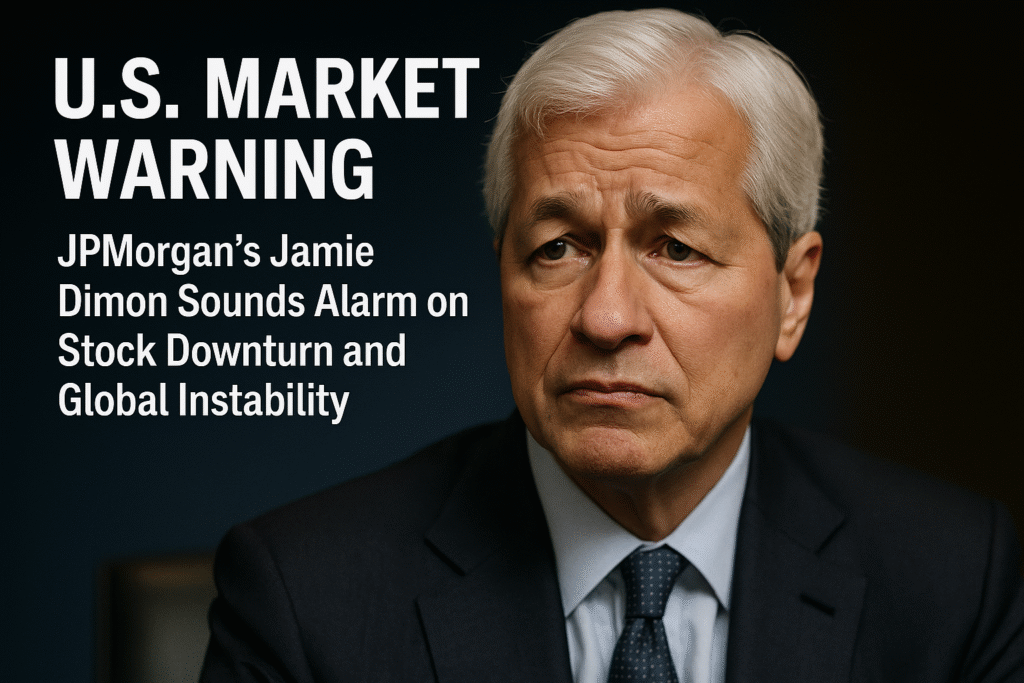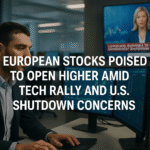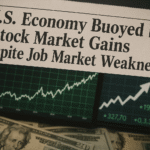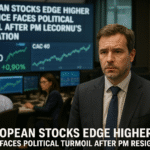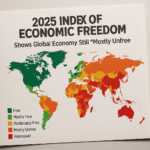By Harshit | October 11, 2025 | New York, NY
The head of JPMorgan Chase, Jamie Dimon, has issued a stern warning to investors worldwide, cautioning that the likelihood of a sharp downturn in U.S. stocks is much higher than most market participants anticipate. In an exclusive interview with the BBC, the CEO of America’s largest bank said he is “far more worried than others” about a potential market correction that could strike within the next six months to two years.
Dimon’s comments come at a time when U.S. markets have reached record highs, buoyed by investor optimism surrounding artificial intelligence, strong corporate earnings, and hopes of stable interest rates. However, beneath the surface, Dimon believes the economic foundation is weakening — pointing to rising geopolitical tensions, excessive government spending, and structural imbalances that could set the stage for financial turbulence.
“The risk of complacency is growing,” Dimon said. “Markets are behaving as if everything will continue smoothly, but history tells us that cycles can turn — and when they do, they turn fast.”
The AI Boom and Growing Unease
The banking veteran described the ongoing artificial intelligence boom as a “double-edged sword.” While acknowledging its transformative potential, Dimon noted that rapid technological disruption has created an “uneasy atmosphere” across the labor market, particularly among workers who fear being replaced by automation.
“The word of the decade is ‘disruption,’” Dimon remarked. “AI is creating extraordinary opportunities, but also deep anxiety — especially for smaller businesses and workers who are unsure where they fit in this new economy.”
Governments, he warned, are unprepared for the speed of change. With AI-driven automation advancing faster than policy frameworks, Dimon urged regulators and policymakers to act decisively to cushion potential social and economic shocks. “We need proactive policies now,” he said, “before the crisis fully hits.”
Economic and Political Headwinds
Dimon’s concerns stretch beyond technology. He criticized the growing fiscal deficits and persistent inflation in the United States, arguing that the country’s position as a stable and reliable global economic leader is being tested. “The United States has become a less reliable partner on the world stage,” Dimon said, referencing strained Western alliances and inconsistent trade strategies.
The warning echoes similar sentiments voiced by other major financial figures, including IMF Managing Director Kristalina Georgieva, who recently said that “uncertainty is the new normal.” Both leaders have highlighted how market optimism and record valuations may be masking deeper systemic risks.
Potential for Market Correction
The JPMorgan chief cautioned that the combination of geopolitical tensions, overvalued tech stocks, and tightening credit conditions could trigger a “major market correction.” Analysts interpret this as a possible drop of 15%–25% in key indices like the S&P 500 and Nasdaq if investor sentiment suddenly shifts.
In the wake of record valuations for major tech firms such as Nvidia, Apple, and Tesla — often compared to the dot-com bubble of the early 2000s — Dimon warned that excessive confidence could leave investors vulnerable. “When markets run ahead of fundamentals, they eventually self-correct,” he said.
He further suggested that interest rate volatility, especially if the Federal Reserve delays cuts or inflation proves more stubborn than expected, could accelerate a sell-off. “If inflation resurfaces or rates stay high, we could see capital flee from equities faster than anticipated,” he noted.
Global Repercussions
A sharp U.S. market correction would likely reverberate across the globe, affecting everything from emerging-market currencies to commodity prices. European and Asian markets, heavily linked to U.S. financial flows, could face significant capital outflows.
Dimon emphasized that risk management must return to the forefront of corporate and investor strategy. “Now is the time for prudence,” he said. “Diversify your assets, manage your leverage, and don’t assume today’s stability will last forever.”
As the global economy stands at a crossroads — between rapid innovation and structural fragility — Dimon’s warning serves as both a caution and a call for preparedness. For investors, the message is clear: the era of easy gains may be coming to an end, and the time to “buckle up” has arrived.

